REPORTS ON WINTER COURSE ON FORCED MIGRATION
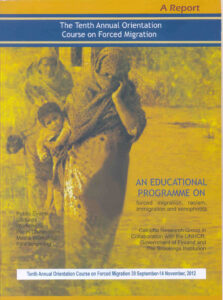
The report (2013) of the Tenth Annual Orientation Course on Forced Migration (30 September-14 November 2012) is collectively written. The report contains genesis of the programme, planning, course structure, course content and the syllabus, the texts of the inaugural and the valedictory lectures, participants’ writings, list of participants and members of the faculty, the participatory nature of the course, note on the field work, an account of distance education as part of the course, and evaluation of the course by faculty members, participants, and evaluators. An additional feature of the report is the different accounts of the discussions in the various course sessions authored by course participants.
For applicants of future courses the report is essential. [Available in Print Form ]
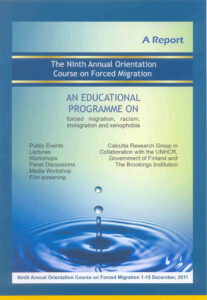
The report (2012) of the Ninth Annual Orientation Course on Forced Migration (1-15 December 2011) is collectively written. The report contains genesis of the programme, planning, course structure, course content and the syllabus, the texts of the inaugural and the valedictory lectures, participants’ writings, list of participants and members of the faculty, the participatory nature of the course, note on the field work, an account of distance education as part of the course, and evaluation of the course by faculty members, participants, and evaluators. An additional feature of the report is the different accounts of the discussions in the various course sessions authored by course participants.
For applicants of future courses the report is essential. [Available in Print Form ]
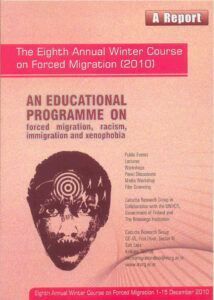
This is a report (2004) on the Creative Writers’ Workshop on Forced Displacement of Population (2003) – perhaps the first of its kind in South Asia. It was held as part of a programme on ‘Media and Displacement’. The first part of the programme concerned with attempts at auditing on the basis of selected cases the mainstream media and its coverage on forced displacement of population from the perspective of human rights, justice and democracy. The other part of the programme was concerned with bringing out a source book on the creative writings of a particular community of victims. The creative writers’ workshop deliberated on these two segments of the programme and dealt at length with issues of creativity and objectivity, ways of seeing and covering an event, the right to communication, victims’ right to communicate, impact of technology on media behaviour, ethics and norms of reporting and editing, narrative techniques, and other issues related to writing.
The programme and the publication have been supported by WACC, London. Edited by Deepti Mahajan and Samir Kumar Das.
Among the major aspects of forced migration in India’s east and north-east that deserve attention are border and boundary confl ict, security, and refugees, the large presence of internally displaced persons in the region due to various confl icts and development projects, and mass-scale displacement due to natural disasters and environmental degradation leading to resource confl icts in recent times. A workshop organised by the Calcutta Research Group in Guwahati in February 2010 refl ected on the present body of work and future trends in research on forced migration in India’s east and north-east.
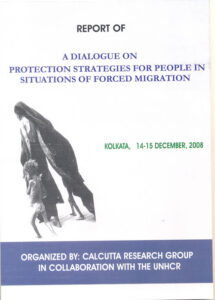
The Dialogue was held as a special segment of the Sixth Annual Winter Course on Forced Migration, which was held with the support of the UNHCR, Government of Finland and the Brookings Institution. On this occasion CRG particularly thanks the UNHCR in assisting and collaborating in holding the conference. Its thanks are also to the Government of Finland and the Brookings Institution for making the Winter Course an important orientation programme towards protecting the rights of the victims of forced migration. It also thanks the Panos South Asia for reinforcing the media component of the entire winter course exercise.
The programme and the publication have been supported by UNHCR [Available in Print Form ]
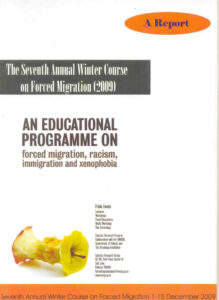
The report (2010) of the Seventh Annual Winter Course on Forced Migration (1-15 December 2009) is collectively written. The report contains genesis of the programme, planning, course structure, course content and the syllabus, the texts of the inaugural and the valedictory lectures, participants’ writings, list of participants and members of the faculty, the participatory nature of the course, note on the field work, an account of distance education as part of the course, and evaluation of the course by faculty members, participants, and evaluators. An additional feature of the report is the different accounts of the discussions in the various course sessions authored by course participants.
For applicants of future courses the report is essential. [Available in Print Form ]
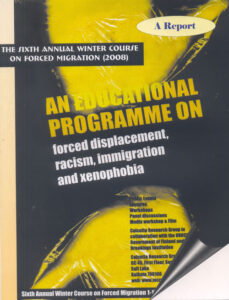
The report (2009) of the Sixth Winter Course on Forced Migration (1-15 December 2008) is collectively written. The report contains genesis of the programme, planning, course structure, course content and the syllabus, the texts of the inaugural and the valedictory lectures, participants’ writings, list of participants and members of the faculty, the participatory nature of the course, note on the field work, an account of distance education as part of the course, and evaluation of the course by faculty members, participants, and evaluators. An additional feature of the report is the different accounts of the discussions in the various course sessions authored by course participants.
For applicants of future courses the report is essential. [Available in Print Form ]
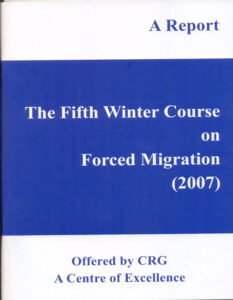
The report (2008) of the Fifth Winter Course on Forced Migration (1-15 December 2007) is collectively written. The report contains genesis of the programme, planning, course structure, course content and the syllabus, the texts of the inaugural and the valedictory lectures, participants’ writings, list of participants and members of the faculty, the participatory nature of the course, note on the field work, an account of distance education as part of the course, and evaluation of the course by faculty members, participants, and evaluators. An additional feature of the report is the different accounts of the discussions in the various course sessions authored by course participants.
For applicants of future courses the report is essential.

The report (2007) of the Fourth Winter Course on Forced Migration (1-15 December 2006) is collectively written. The report contains genesis of the programme, planning, course structure, course content and the syllabus, the texts of the inaugural and the valedictory lectures, participants’ writings, list of participants and members of the faculty, the participatory nature of the course, note on the field work, an account of distance education as part of the course, and evaluation of the course by faculty members, participants, and evaluators. An additional feature of the report is the different accounts of the discussions in the various course sessions authored by course participants.
For applicants of future courses the report is essential.
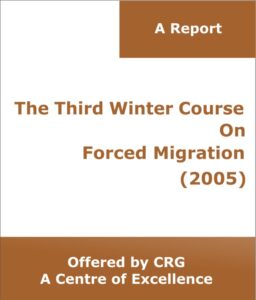
The report (2006) of the Third Winter Course on Forced Migration (1-15 December 2005) is collectively written. The report contains genesis of the programme, planning, course structure, course content and the syllabus, the texts of the inaugural and the valedictory lectures, participants’ writings, list of participants and members of the faculty, the participatory nature of the course, note on the field work, an account of distance education as part of the course, and evaluation of the course by faculty members, participants, and evaluators. An additional feature of the report is the different accounts of the discussions in the various course sessions authored by course participants.
For applicants of future courses the report is essential.
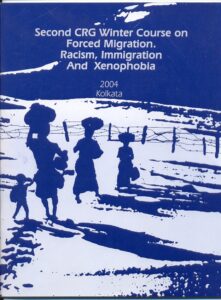
The report (2005) of the Second Winter Course on Forced Migration (1-15 December 2004) is collectively written. The report contains genesis of the programme, planning, course structure, course content and the syllabus, the texts of the inaugural and the valedictory lectures, participants’ writings, list of participants and members of the faculty, the participatory nature of the course, note on the field work, an account of distance education as part of the course, and evaluation of the course by faculty members, participants, and evaluators. An additional feature of the report is the different accounts of the discussions in the various course sessions authored by course participants.
For applicants of future courses the report is essential.
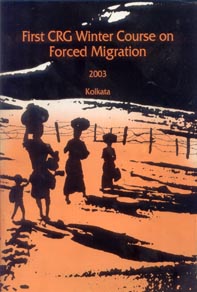
First Winter Course on Forced Migration
The report (2004) of the First Winter Course on Forced Migration (1-15 December 2003) is collectively written. The report contains genesis of the programme, planning, course structure, course content and the syllabus, the texts of the inaugural and the valedictory lectures, participants’ writings, list of participants and members of the faculty, the participatory nature of the course, note on the field work, an account of distance education as part of the course, and evaluation of the course by faculty members, participants, and evaluators. An additional feature of the report is the different accounts of the discussions in the various course sessions authored by course participants.
For applicants of future courses the report is essential.
